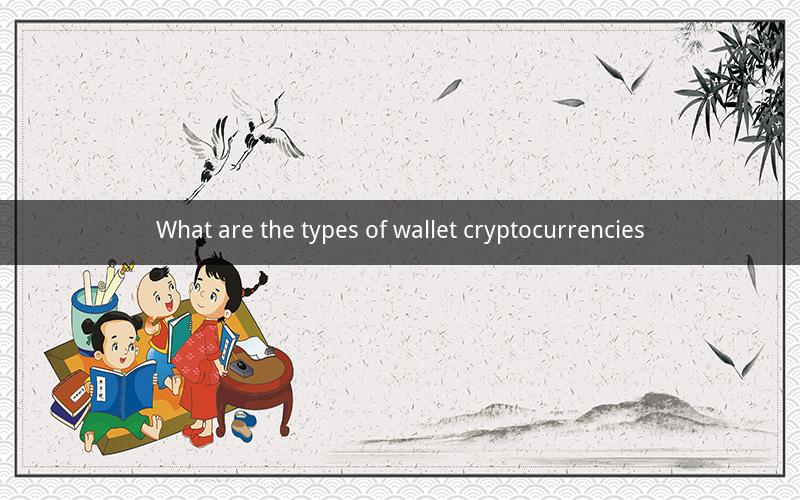
Contents
1. Introduction to Cryptocurrency Wallets
2. Hot Wallets: Convenient for Daily Transactions
- Mobile Wallets
- Web Wallets
3. Cold Wallets: Secure for Large Amounts
- Hardware Wallets
- Paper Wallets
4. Combination Wallets: Balancing Security and Convenience
5. Smart Contracts and Multi-Signature Wallets
6. Choosing the Right Wallet for Your Needs
7. Conclusion
1. Introduction to Cryptocurrency Wallets
In the rapidly evolving world of cryptocurrencies, a wallet is an essential tool for managing and securing digital assets. Cryptocurrency wallets are digital wallets that store, send, and receive cryptocurrencies. There are various types of wallets, each with its unique features, advantages, and limitations.
2. Hot Wallets: Convenient for Daily Transactions
Hot wallets are online wallets that are easily accessible and convenient for daily transactions. They are connected to the internet, which makes them more susceptible to hacking and theft. However, they offer the following types:
- Mobile Wallets: These wallets are designed to be used on smartphones and tablets. They are user-friendly and allow users to easily send and receive cryptocurrencies on the go.
- Web Wallets: Also known as online wallets, these are wallets that are accessed through a web browser. They are easy to use and offer a range of features, including the ability to track transactions and manage multiple cryptocurrencies.
3. Cold Wallets: Secure for Large Amounts
Cold wallets are offline wallets that are considered more secure than hot wallets. They store cryptocurrencies in a non-internet connected environment, making them less susceptible to hacking and theft. Here are the two primary types:
- Hardware Wallets: These are physical devices that store cryptocurrencies offline. They are considered one of the most secure types of wallets, as they use hardware encryption to protect your private keys.
- Paper Wallets: These are printed documents that contain private and public keys. They are the oldest form of cold storage and are considered to be one of the most secure methods of storing cryptocurrencies.
4. Combination Wallets: Balancing Security and Convenience
Combination wallets offer a middle ground between hot and cold wallets. They provide a balance between security and convenience, allowing users to store a significant amount of their cryptocurrency offline while still being able to access it online.
5. Smart Contracts and Multi-Signature Wallets
Smart contracts and multi-signature wallets are specialized types of wallets that offer additional security and functionality.
- Smart Contracts: These are self-executing contracts with the terms of the agreement directly written into lines of code. They are used to automate transactions and agreements between parties.
- Multi-Signature Wallets: These wallets require multiple private keys to authorize a transaction, which adds an extra layer of security. They are often used for joint accounts or to ensure that no single individual can control the funds.
6. Choosing the Right Wallet for Your Needs
When choosing a cryptocurrency wallet, it is essential to consider your needs, such as how often you will use it, how much you will store, and how secure you want your assets to be. Here are some factors to consider:
- Security: Hardware wallets are the most secure, followed by paper wallets and multi-signature wallets.
- Convenience: Mobile wallets and web wallets are the most convenient, but they are also the least secure.
- Cost: Hardware wallets are generally more expensive than other types of wallets.
- Features: Some wallets offer additional features, such as the ability to earn interest on your cryptocurrency or integrate with decentralized applications.
7. Conclusion
Cryptocurrency wallets are essential for managing and securing digital assets. Understanding the different types of wallets and their features can help you choose the right wallet for your needs. Whether you prefer the convenience of a hot wallet or the security of a cold wallet, there is a wallet out there that can meet your requirements.
---
Questions and Answers
1. Q: What is the primary difference between hot and cold wallets?
- A: Hot wallets are online and easily accessible but more susceptible to hacking, while cold wallets are offline and considered more secure.
2. Q: Which type of wallet is best for daily transactions?
- A: Mobile wallets and web wallets are best for daily transactions due to their convenience and ease of use.
3. Q: Are hardware wallets more expensive than other types of wallets?
- A: Yes, hardware wallets are generally more expensive than other types of wallets due to their advanced security features.
4. Q: Can you store multiple cryptocurrencies in the same wallet?
- A: Yes, many wallets allow you to store multiple cryptocurrencies in the same wallet.
5. Q: What are smart contracts used for in cryptocurrency?
- A: Smart contracts are self-executing contracts with the terms of the agreement directly written into lines of code, used to automate transactions and agreements.
6. Q: Are paper wallets considered a secure form of storage?
- A: Yes, paper wallets are considered a secure form of storage, as they are offline and not connected to the internet.
7. Q: Can a multi-signature wallet be compromised if one of the private keys is stolen?
- A: No, a multi-signature wallet requires multiple private keys to authorize a transaction, so even if one key is stolen, the wallet remains secure.
8. Q: What should you do if your cryptocurrency wallet is lost or stolen?
- A: If your wallet is lost or stolen, you should immediately change your passwords and notify your wallet provider. If you have a backup, you can restore your wallet using the backup.
9. Q: Are there any risks associated with using a web wallet?
- A: Yes, the primary risk with using a web wallet is the potential for hacking and theft, as it is connected to the internet.
10. Q: Can you earn interest on your cryptocurrencies in a wallet?
- A: Some wallets offer interest-earning features, but not all wallets provide this service. It is important to research wallets that offer interest and ensure they are reputable.